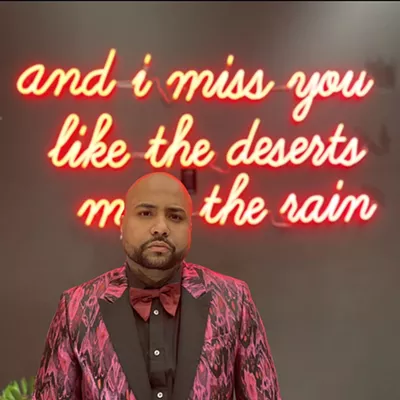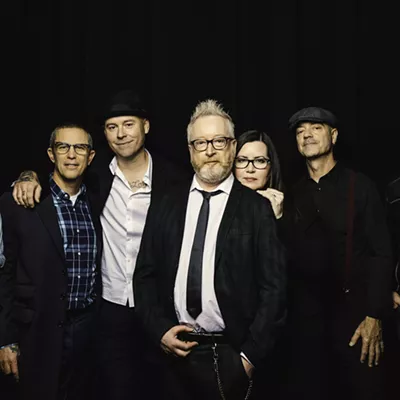In 10 years, Fourkiller Flats have experienced the surging good times of a band on the rise, plenty of booze-filled nights, a pile of tour antics they'll laugh about forever, a breakup, a resurrection, and eventually the sort of contentment that comes from simply playing music on their own terms.
Looking at the details—ups and downs, hard living and heartache—the band's history actually starts to sound like a Fourkiller Flats song.
Now the Flats are releasing a new record—the band's first since 2001 and just their second full-length overall. It's hard-charging rock 'n' roll: rough, twangy and loud, and full of raise-your-drink-and-sing-along hooks.
Beloved if not prolific, they've been playing most of the songs for years, with steady gigs downtown; the band's unofficial home base is Che's Lounge.
"We've been milking the same 30 songs for eight years," jokes singer-guitarist Jim Cox. "We definitely took our time and weren't stressed about it. Even though it's quote-unquote new material, the songs have been around a while. If we have a song we've played for a while, by the time we get to the studio, we can really bang it out."
Recorded over about six months, Treasure and Trash is well worth the wait, bringing a more revved-up rock 'n' roll ferocity to the trademark Flats sound (described on the band's MySpace as "Chunka Chunka Chunka Chunka WAAAAAAAAAA weedle dee weedle deee WAAAAAAA Chunka Chunka Chunka").
"We took the time to record organically. There's no overproduction," says drummer Bill Green, who also adds harmony vocals. "It's pretty damn close to what we sound like in a live show. It's us. That's just what we do."
The Flats split not much more than a year after their first album was released, and originally got back together in August 2005 for the Songs for Susan (Sykes) benefit. Their next two performances followed quickly, at Club Congress' 20th anniversary and at a show for guitarist Neal Bonser's 40th birthday at Che's Lounge.
"Then, at the insistence of Bill, (we) went into the rat hole for six months to write new songs," Bonser says.
The core elements of the Flats sound are simple: Cox's deep and weary voice, which ranges from mournful to audacious; Bonser's expressive and explosive lead guitar; and the steady rhythm anchor of Green on drums and bassist Chris Morrison.
"When I joined, all I did was listen to Willie Nelson. Before, all I listened to was indie rock and heavy metal," says Morrison, explaining that the band's musical cohesion comes from their friendship as much as anything.
"It didn't jell again until Chris was playing bass. You get the right mix of people, and it just works," Green says. "We started back up again with no major plan. We just liked playing. We didn't even think about making a record."
The Flats started slowly, recording and mixing the song "Treasure and Trash" start to finish before moving on to anything else, just to test out how they liked recording in a new environment at Nathan Sabatino's Loveland Studio.
"I had the chorus in my head when I was riding my bike to work a half-hour every day. I was just singing it over and over for weeks; then I came home one day and banged out the rest," Cox says.
In a distinct departure from the band's early days, it's the only song on the album that Cox brought to the rest of the band already finished. The writing process now is a through-and-through collaboration.
"It used to be that Jim would bring in a song completely written, and Bill and I would tweak it. Jim would write a country song by himself, and we'd turn it into a rock song," Bonser says. "Now, most of the songs are written completely as a band. It's just more organic."
Treasure and Trash features 10 originals and a cover song—"A Thousand Songs About California," by Austin roots-rockers Milton Mapes. Like Whiskeytown's "Faithless Street," which the Flats covered on the self-titled 2001 record, it's a song that they've not only come to own; it also has all the marks of a Flats original.
With songs rooted in drinking, criminal behavior, girls, cheatin' and cars, Cox says he goes for an overall vibe, striving for mood over story. Some are autobiographical, but more often, he'll grab a handful of artistic license and build lyrics out of a certain turn of phrase.
"Dry Sunday" comes from Cox's college days in Savannah, Ga., when beer runs across the border into South Carolina were not only a weekly tradition, but formed the core of those perfect Sundays strumming guitars on the porch.
"Durango" is the first song the Flats wrote after getting back together, while another cut, "Stellar Dope," dates to 1999. The album closes with fan-favorite "Cat Song," recorded live at the Tucson Roller Derby.
"Mindful," the album's lone song that hasn't been played live, is a front-porch folk tune, built out of dobro and guitar. It's a drunken jam, definitely not perfect and not meant to be, Cox says.
"That song was a case of, get drunk on a Tuesday night and write it; get drunk on the next Tuesday night and record it," Bonser says.
Ten years in, the band can't help but look back. Especially sitting around after practice, they revel in telling old tour stories.
"There was a window (when) we got some national press. But we needed to get in a van for 40 weeks. Bloodshot (Records) would've signed us if we could've seriously gotten on the road. But for me, I was probably two years too old," Bonser says.
"Where would we be now if we had done that?" Cox asks.
"We'd have made another record or two and gotten signed, and now we'd hate each other," Bonser says. "Without the exact lineup we have now, I wouldn't do it again."













